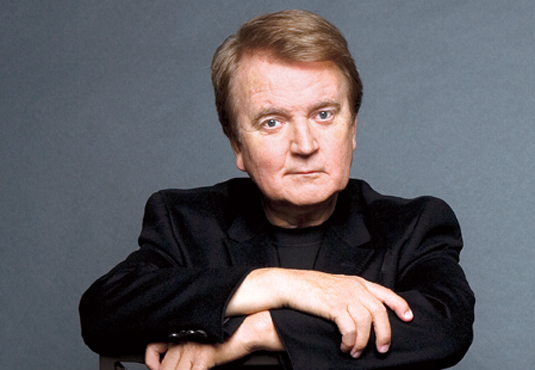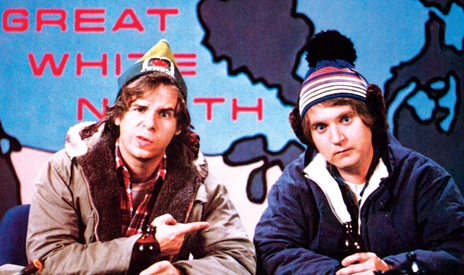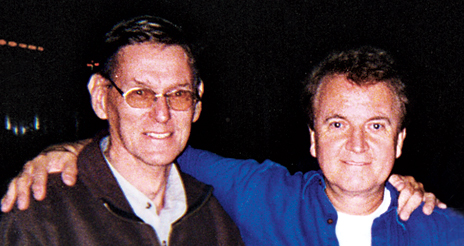Vernon Kee, OCT Dave Thomas recalls Jim Arthur
|

Dave Thomas's
|
 |
| Rick Moranis and Dave Thomas were Bob and Doug McKenzie in Strange Brew, 1983. |
“Although I went on to write mainly TV and not books or scholarly works, I always approached it with this inspiration from Jim McArthur in mind. Shakespeare wrote for his audience, for the groundlings at the Globe Theatre. His plays made his audience laugh and cheer. So when I started working I wanted to write TV comedy that connected with my audience the way Shakespeare connected with his audience.
“I was lucky enough to get SCTV as a platform for that kind of writing. The show gave me an opportunity to write, write, write and a chance to create characters that I hoped would connect with the audience.”
Thomas points out that McArthur was not a stereotypical academic but a well-rounded man who was also the football coach.
“I was not only the football coach, I was the volleyball coach and I helped in track and field. It was a small school where you did everything. I had to coach basketball too, and I didn’t know a damn thing about it.
“I guess I just guided him in some way into the poetry of literature, whether it was Hamlet or Conrad’s Heart of Darkness, because those are beautifully structured things, with images repeating themselves. Dave was fascinated by the idea of writing being a clever manipulation of language. He just loved that.”
Of course, Dave Thomas was already a funny guy in Grade 13.
“He sat in the front and every once in a while he made a joke – and that made me feel really good, that he felt comfortable enough to do that,” McArthur says.
“But he was always very respectful. If he wanted to go on for too long like Dave Thomas the funny guy, I just gave him a little look and he’d cool off.”
Thomas has his own theories about his penchant for humour.
“I believe that being funny is a condition, not a talent. It’s what somebody does to survive, not something you’re born with as a gift.
“I could make people laugh, but I usually did it for a reason, to make a girl like me, you know, to become accepted,” Thomas says. “I wasn’t athletic at all, and at Dundas District you could either be on the track team or the football team, and I couldn’t do either. So there was no other way to distinguish myself except with my comedy.”
Regardless of its origin, Thomas has the self-deprecating comedy thing down pat and dips into the well when asked if he would describe himself as a good student.
“I think I was just good at writing exams,” he says. “But I didn’t really know that much.”
In any event, in Grade 13 English Thomas excelled in what were known at the time as departmental exams – exams not graded by your own teacher.
“I was so inspired by this guy, Jim McArthur,” says Thomas, “I actually got the highest grade in the school in my English final, and he was pretty proud of that.” Thomas pauses momentarily, as if an idea is occurring to him for the first time. “And so was I. I was so pleased that I could show him his teaching worked.”
 |
| Jim McArthur and Dave Thomas in 2000 |
Through Grade 13 and the following summer, Thomas got to know Jim and Fran McArthur not just as teachers but as people. “I kept in touch and kind of consulted with Jim as I went through college,” he recalls of his years at McMaster. “When I was just out of high school I introduced Jim and Fran to my pals. Marty Short and I went up to Owen Sound and stayed at their house. So they knew Marty and Eugene Levy and those guys when we were starting out in comedy.
“And I’ve stayed in touch. I talk to Jim on the phone all the time. They’ve come down to California to visit.”
McArthur says he is happy to have been there for Thomas at an important transitional stage in his life. “When kids are breaking away from Mom and Dad, they find an adult substitute,” he says. “Dave used to come up and visit. And he was interested in the girl across the street – oh, maybe I should have kept quiet about that.” He laughs. “But he’d come in and talk till three in the morning. It was a huge compliment. I was pleased because not only did I respect him, I respected his loyalty. He has been wonderful.”
“We still get frequent calls when he’s on the Pacific Coast Highway on his way home from the office. The phone cuts out a few times when he goes under tunnels but he calls back, and the conversation ends when he pulls into his driveway. I think that’s just wonderful.”
Considering the positive impact he had on Dave Thomas, what message would Jim McArthur have for young teachers everywhere today?
He breaks it down into four points:
“One, you have to know your subject,” says McArthur. “You can’t go in and pretend.
“Two, you have to really like it.
“Three, you must be enthusiastic about it.
“And four, you have to be open and fair with kids. You have to be, so that the kids trust you.
“It worked for me.”
As Thomas has said, the number one reason he wanted to love literature was that Jim McArthur seemed to love it so much.
“Oh, I did,” McArthur agrees. “A teacher without enthusiasm might as well go somewhere else. I just loved my job.”
All things considered, Jim McArthur was kind of the missing link between William Shakespeare and Dave Thomas. Who knew?
“Look, nobody liked Shakespeare in high school. It’s ridiculously difficult to understand. I didn’t get it.
“So then I get this guy, Jim McArthur, who’s like a UN translator. He’s spitting it out in a way that we can get it. My ears definitely perked up.
“First, I’m thinking, ‘There’s no way I’m going to get hit with a book here.’ And second, ‘The guy actually has something to say – and look how much he loves it.’ That was the weirdest thing.
“It’s the same as parenting. You tell your kids anything, they don’t listen, but they look at you and the life you lead, and that’s what they use. That’s their yardstick.”
Ultimately, having a true passion for what you do is the most direct path for a teacher to connect with a student.
“Kids will pick up on that,” says Thomas, adding “Well, some won’t – there are some tough nuts you just can’t crack. But with Jim McArthur, they all got treated with respect.
“Nobody disliked this guy. I’ve stayed friends with some of the other guys who were in that class, and they’re working in every different walk of life there is, and they’ll all say, ‘He was a good guy.’ Every one of them. Jim McArthur just struck you as a good guy.”
What a tremendous personal and professional legacy.











